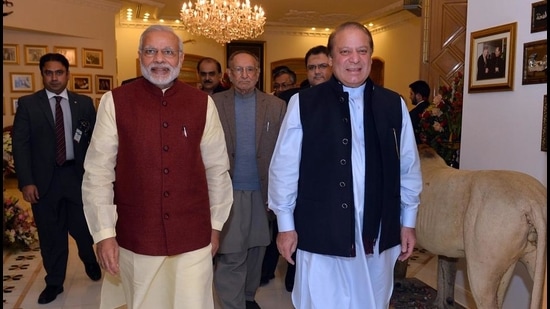The difficult path to Indo-Pak peace
Pakistan’s army is on board with the ceasefire. But unless it revises its position on terror and Kashmir, talks will hit a barrier
The careful formulations in the joint statement of the India-Pakistan director-general of military operations (DGMO) are clearly the product of “diplomatic” negotiations which would have involved the governments and not the two armies alone. Its purpose is, therefore, much more than the maintenance of peace and tranquillity along the Line of Control (LoC) and the international border (IB) in Jammu and Kashmir (J&K); it is to renew the bilateral engagement after a hiatus of almost five bitter years.

The exact mode adopted by India and Pakistan to conclude the joint statement matters little. In the grand scheme of inter-State relations, officials and even ministers are merely instruments of the final arbiters of a bilateral relationship — in India, an all-powerful prime minister (PM) while, in Pakistan, the army chief along with other senior generals. The fact that this renewal process has begun with a military-to-military statement establishes that the Pakistan army is on board with this process.
This is significant as PM Narendra Modi’s first foray at peace-making with Pakistan had been directed at its civilian leadership. That completely miffed the generals. As a retired senior Pakistani general sneered during a track-two interaction, “Modi’s Lahore visit led to a meeting of two kings. It had nothing to do with the two states.” Obviously, he signalled that what mattered, at least for India, was the Pakistani army. And, the army responded to the Lahore initiative with the Pathankot, Uri and the Pulwama terrorist attacks. It should also not be forgotten that 16 years prior to Modi’s Lahore foray, the Pakistan army had responded to Atal Bihari Vajpayee’s Lahore peace-making effort with its Kargil misadventure.
While the army is a part of this engagement effort and PM Imran Khan, on the ropes politically, will join in, the crucial question is to what extent the Pakistani establishment is willing to turn its back on terror. Despite some judicial action against India-oriented terrorist groups, to get off the Financial Action Task Force (FATF) hook, there is no evidence, as yet, of a fundamental shift in Pakistani thinking on excluding terror from its strategic doctrine.
Instead, Pakistan has strenuously sought to paint India as the sponsor of State terrorism, especially since the constitutional changes in J&K of August 2019. Along with this, it has used every forum to paint the Sangh parivar in Nazi colours. It has also called for the restoration of the special status of the erstwhile state and a cessation of India’s so-called genocide. Hence, the paramount questions are: What are the concessions that Pakistan will want on J&K to calm jihadist sentiment both in the groups and the Pakistani public and how far can Modi go? This is particularly challenging, especially after his muscular approach since the surgical strikes and more so after the enunciation of the pre-emption doctrine post the Balakot aerial attack.
Modi and the Pakistani army would have given at least some thought to these basic issues. Both would have in mind a set of minimum requirements of the other side as well as how steps will be sequenced and rhetoric controlled. How much of this has already been discussed between the interlocutors is not known. What is clear though is that if there was a decision to tone down propaganda, Pakistan has not adhered to it, as is evident from its strident tones in its response to the second anniversary of the Balakot strike and in Imran Khan’s tweets. India marked the anniversary with restraint.
In the coming weeks and months, both countries will have to ensure that peace is maintained along the Line Of Control and the IB in J&K. That should not be difficult unless elements in Pakistan cannot resist some measure of infiltration as the snow melts. Should that take place, the Indian Army will have to act to prevent it, even if this has the danger of creating holes in the DGMO’s agreement. As electioneering intensifies for the assembly elections, and if firing incidents occur, Modi may be forced to publicly declare that the army will have a free hand to act. That will not be conducive to this incipient engagement process.
Worse will be a major terrorist attack from Pakistan during the next couple of months and even thereafter. Modi will not be able to keep the initiative alive, as he attempted after the Pathankot strike. This will be so even if the Pakistani establishment seeks to assure him that it was a rogue operation and moves to take some kind of action against Pakistani elements. New Delhi may then be compelled to deny that any engagement process was even contemplated and that the DGMO’s agreement was nothing more than military-to-military.
There is precious little that Modi can give Pakistan on its “core” issue. He cannot restore J&K’s special status but can restore a truncated statehood. Will this be sufficient for Pakistan to claim victory? As on terror, so on J&K, the onus is on Pakistan to move ahead and also consider anew its own destiny. The generals have shown no capacity for such bold thinking which demands jettisoning “Nazaria-e-Pakistan” rooted in the two-nation theory.
The history of India-Pakistan ties is littered with false dawns. Will this be one more?
Vivek Katju is a retired diplomat who has extensively dealt with Pakistan
The views expressed are personal





